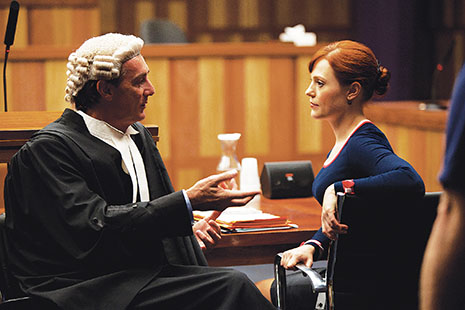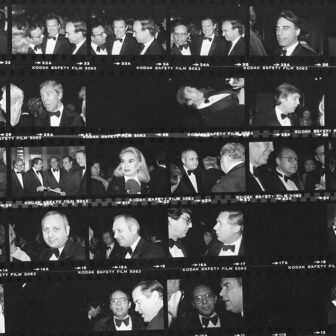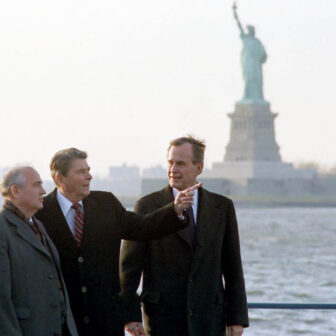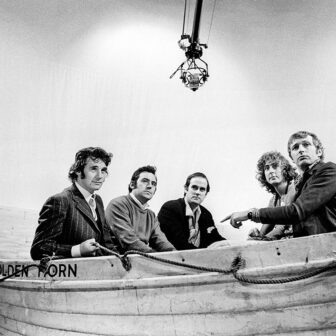FOR a few years in the mid 2000s, the ABC screened barely any new Australian drama. This record-breaking slump, which reached an all-time low of just three hours of programs in the year ending June 2005, spurred an industry-led campaign and a degree of public controversy that convinced the federal government to increase the corporation’s funding. An extra $70 million was provided for drama, with the majority earmarked for 2011–12. The new twenty-two-part courtroom drama series Crownies, made for the ABC by the independent production house Screentime, is the principal product.
Two other major ABC dramas are either in production or recently completed – the thirteen-part period detective series Miss Fisher’s Murder Mysteries, adapted from Kerry Greenwood’s Phryne Fisher novels, and an eight-part adaptation of The Slap, based on Christos Tsiolkas’s award-winning novel of the same name. But Crownies probably carries the most cultural baggage and weight of expectation. As the most expensive and energetically promoted component of the ABC’s new programming strategy, it represents the corporation’s renewed commitment to local drama and, by extension, to the local production industry. Not only must it perform the duties of reflecting, contributing to, and interrogating cultural identity and Australian diversity, but it must also convincingly depict the workings of one of the core institutions of Australian society.
With its theme song “What Do I Do?” setting the tone, Crownies sets out to engage with the ethical and moral quandaries raised in legal proceedings. Within the first few episodes a group of young prosecuting solicitors – the crownies of the title – and their colleagues in the office of the Director of Public Prosecutions face a series of dilemmas and compromising situations that test their sense of justice, strain their family loyalties and bring their professional competence and allegiances into question. Their capacity for objectivity and sound judgement are constantly tested as they struggle with emotionally charged cases that resonate with their own lives.
Ben, the rakish lad-about-town whose family connections have given him a leg-up on the professional ladder, demands biblical justice for the killer of his grandfather, only to realise that murder and manslaughter can be a bit more complicated when he has to provide advice on the prosecution of a father who inadvertently killed his infant son. Janet, the experienced prosecuting counsel, is undergoing fertility treatment when she is chosen to lead the case against a mother accused of killing her children. Lina, a non-practising Muslim, is cultivated by a Jewish judge keen to promote reconciliation in the Middle East just as her brother comes to the notice of those monitoring radical Islamist sympathisers. Julie, a judge’s associate, discovers her sister has been arrested on drugs charges and, fearing for her own professional future, asks her judge to compromise his own standing by intervening on her behalf. And all the while, a cloud of suspicion hangs over the group after a leaked memo leads to a police investigation that throws doubt on the honesty and integrity of all the leading characters.
Many of the storylines resonate with real cases and public debates. The opening episodes feature the young solicitors dealing with multiple cases of sexual exploitation of children, domestic violence and murder, while the department struggles with a poll-driven state government desperate to legislate to allow the indefinite detention of some offenders. The relationship between the law and politics and the way that political pressure can threaten to compromise the independence of the prosecutors are major themes that run through the series. Other major threads explore the prosecutors’ professional and personal relations with police and journalists. The characters are constantly reminded of the ethical minefield they traverse each day, and through their actions and professional dealings they confront the unspoken but ever-present question: what is the right thing to do?
This focus on the work of prosecutors in the court system sets the series apart from recent dramas, documentaries and reality shows that depict either Australia’s criminal underworld (Nine’s Underbelly series, Crime & Investigation’s Tough Nuts, and Seven’s Gangs of Oz and forthcoming Wild Boys) or the workings of various police departments (Seven’s City Homicide, The Force and Highway Patrol, Ten’s Rush, and SBS’s East West 101). It also distinguishes Crownies from two other recent court-set ABC programs: On Trial, a compelling fly-on-the-wall series in which criminal trials and their associated processes and rituals are fully documented for the first time; and the drama series Rake, returning later this year, which charts the escapades of a colourful defence barrister played by Richard Roxburgh.
CROWNIES strengthens the case made by the ABC’s director of television, Kim Dalton, in the annual Henry Mayer Lecture earlier this year. In this time of media convergence, he argued, television is not only far from dead, it remains at the heart of Australia’s cultural and creative industries.
This view of TV is reflected in the regulations that guide Australian broadcasting. The Australian Content Standard for commercial free-to-air television stations and the charters of the ABC and SBS each state that Australian television programs must develop and reflect a sense of Australian identity, character and cultural diversity. The Content Standard (but not, notably, the two charters) places particular cultural weight on the contribution of television drama to Australian identity, requiring commercial television broadcasters to screen a certain amount of new drama each year. The public broadcasters’ charters require the ABC and SBS to screen programming that contributes to Australian identity and reflects Australian cultural diversity, but doesn’t impose specific genre quotas.
This difference in rules is worth noting because the government’s current Convergence Review is taking the future of Australian content regulation seriously. A number of submissions to the review have argued that the existing regulations need to be revised, and it seems likely that the review will recommend changes, perhaps including genre quotas for the ABC, SBS and new outlets such as IPTV, the television-like services delivered over the internet.
In describing the television industry as “the cornerstone of audiovisual content creation in Australia” Dalton was not simply blowing television’s trumpet, he was sounding a warning to the Review that any change to Australian content regulation or to the broader set of regulations affecting television will not only affect broadcasters but could also have serious consequences for the production industry and the creative industries more broadly. It remains to be seen if this will be the case, but what does seem clear is that the Review committee shares the view that the production sector must be supported. Evidence of this came with the release of the committee’s recent Emerging Issues Paper, which included a new principle – that “local and Australian content should be sourced from a dynamic domestic content production industry.”
Crownies is a product of that industry, and the fact that the ABC has outsourced the creation of the series to an external production house means it been caught up in the growing debate about outsourcing at the national broadcaster. The ABC has been outsourcing drama programming to independent producers for quite some time, and it appears that arts programming will also no longer be made in-house. Whether this sparks a broader debate about the ABC’s role in shaping cultural identity, diversity and attitudes remains to be seen. The ABC journalist and former staff-elected director Quentin Dempster certainly has concerns: in an article published in the Fairfax press the day after the cuts to the arts division were announced, he called for a public inquiry into “the siphoning of taxpayers’ funds to the commercial sector to establish the facts about the compromising of the ABC’s public purpose.” He cited Crownies as an example of the “Hallmark TV, Reader’s Digest documentary or lightweight, sexed-up and formulaic drama pitched at an AB demographic” that is a result, he claims, of the shift to commissioning programs from the commercial sector.
Commissioning programs rather than making them in-house might mean that the ABC doesn’t hold the rights to these programs, and so may not be able to earn revenue from any subsequent sales to overseas broadcasters or to other services in Australia, but we don’t know for sure because the terms of these deals have not been made public. The argument that external commissioning undermines the ABC’s independence and public purpose, reduces its skills base and creative culture, and limits the corporation’s capacity for originality, innovation and risk-raking may carry more weight. It depends, though, on the decisions made by those in charge of commissioning, how qualified they are to uphold the cultural objectives outlined in the ABC’s charter, and whether these objectives are best served by internal or outsourced production.
It’s also important to remember that the ABC Charter doesn’t mention production as one of the functions of the ABC; rather, it states that the corporation is required to “provide” programs and services that “contribute to a sense of national identity and inform and entertain, and reflect the cultural diversity of, the Australian community.” While only a few years ago the ABC’s provision of Australian drama was very much in question, in my view Crownies clearly fulfils the terms of the charter.
LIKE the other major ABC drama productions for this year, Crownies draws deeply on the talent within the domestic production industry. The twenty-two episodes are shared among seven directors, including Tony Tilse, who has worked on Underbelly and City Homicide among many others; Cherie Nowlan, a regular director of Packed to the Rafters and the ABC’s teen drama series Dance Academy; and the director of Babe, Chris Noonan. The series also uses a team of ten writers, including experienced hands, new names and several former lawyers. Among the cast, there is a fairly even split between alumni of Home and Away – Todd Lasance (who plays Ben McMahon), Ella Scott Lynch (Erin O’Shaughnessy) and Indiana Evans (Tatum Novak) – and those with extensive film, theatre and television experience – Hamish Michael (Richard Stirling), Marta Dusseldorp (Janet King), Andrea Demetriades (Lina Badir) and Jeanette Cronin (Tracey Samuels).
Crownies has borrowed more than a director from Underbelly – its look and style are undoubtedly inspired by the other program. In both series, the recent fetish for handheld camerawork and frenetic editing in police and crime drama has been replaced by a fluid, filmic look, underlining these series’ claims to be seen as quality drama. Subtle camera moves and longer shot lengths give the drama time to breathe and grow, and the viewer can focus on the actors’ performances and words rather than being jolted and disoriented by fast cutting and constantly shifting framing.
With this filmic style and use of established industry talent, Crownies lays claim to being a “quality” production, placing it squarely in the middle of another debate about the future of broadcasting and its associated creative industries. “Quality” was a theme explored with some passion in Kim Dalton’s Mayer Lecture, and it also appears in many of the submissions to the Convergence Review, principally in relation to television drama. But what constitutes “quality” has long been argued over, and critics of public broadcasters, here and overseas, have often portrayed this kind of content as elitist or highbrow. Delivering the annual MacTaggart lecture at the Edinburgh International Television Festival in 1989, Rupert Murdoch famously remarked, “Much of what passes for quality in British television is no more than a reflection of the values of the narrow elite which controls it.”
While Murdoch’s views on cultural value may now carry less weight than they once did, it is notable that those who invoke “quality” as a defence of certain kinds of Australian content – and the regulations, subsidies and incentives that support it – tend to be representatives of the production and broadcasting industries. In the Convergence Review and in Dalton’s lecture, “quality” means professionally produced, big-budget programming with high production values. It is deliberately juxtaposed with the user-generated content that appears, for instance, on YouTube, partly because of concerns within the industry that the review may be swayed by the argument that user content made by Australians also contributes to and reflects cultural identity and diversity, and could conceivably be included in any expanded Content Standard.
Crownies is a prime example of what the “quality” argument means in practice. It also ticks the “contribution to national identity and cultural diversity” box with its depiction of the workings of a major state institution, its concern with ethics, values, power and politics, and its coverage of a range of issues and characters.
Whether television drama will remain the best or most appropriate form to achieve the cultural objectives outlined in the Broadcasting Services Act remains a moot point. But Quentin Dempster’s implied charge that Crownies is “lightweight, sexed-up and formulaic” is, on the evidence so far, hard to sustain. Rather, the series provides clear proof that the Australian production industry can produce high-quality, serious drama that engages and entertains Australian viewers. On the one hand, the point made by some critics that the series is virtually indistinguishable from commercial television drama raises the question of what the identity and purpose of the ABC are or should be. On the other hand, the point could be seen as highly complimentary, given the popularity and critical acclaim that programs like Underbelly have received.
Setting Crownies to one side, the question of whether the ABC is dumbing down, selling out and failing in its public mission is very much open for debate. It’s to be hoped that those with strong views one way or the other will make submissions and contributions to the Convergence Review, given that the process will have a major influence on media policy and regulation, on the future of the ABC and on the future of Australian drama. •




